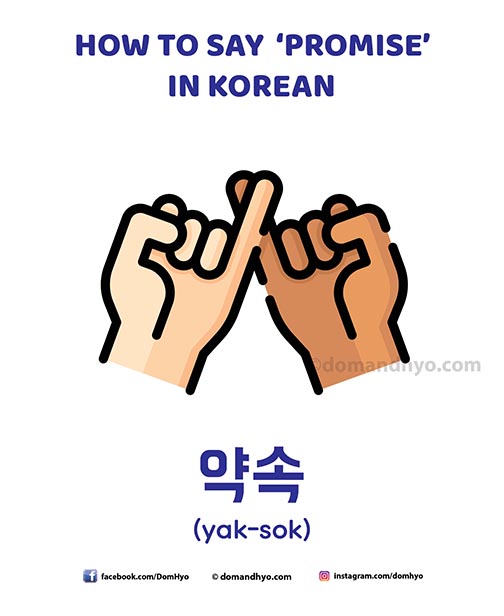
Today, we’re going to teach how to say ‘promise’ in Korean. This is another simple, beginner-level word/phrase that you can use and recognize immediately if you listen in on Korean conversations or watch Korean television. Ready to learn? It’ll be easy, we promise!
약속 (yak-sok)
This is the simple noun for the ‘promise’. Like many other nouns in Korean, you can ad ‘하다’ to turn it into a verb. So then you would get ‘약속하다’ which means ‘to promise’. The verb form is used often, and the noun is also used often just by itself as a way of saying ‘Promise!’ or ‘I promise!’.
Another common way Koreans use this verb is to say they have a plan or meetup later in the day or later in the week. You might ask someone to hangout tomorrow, but they might say to you ‘내일 약속 있어.’ (nae-il yak-ssok i-sseo) which the literal translation means ‘Tomorrow, I have a promise’. But in this context, it translates to something more like ‘I have plans tomorrow.’
Here are the basic conjugations for this verb.
약속해요 (yak-sso-kae-yo) = present tense (declarative standard polite)
약속했어요 (yak-sso-kae-sseo-yo) = past tense (declarative standard polite)
약속할 거예요 (yak-sso-kal kkeo-ye-yo) = future tense (declarative standard polite)
What about using this word in a sentence? Let’s check out some examples:
친구와 점심 약속이 있다. (chin-gu-wa jeom-sim yak-sso-gi it-tta) = I have a lunch date with a friend.
나는 그를 돌보기로 약속했다. (na-neun geu-reul ttol-bo-gi-ro yak-sso-kaet-tta) = I promised to look after him.
나는 약속을 지키는 사람이다. (na-neun yak-sso-geul jji-ki-neun sa-ra-mi-da) = I’m a person of my word.
계획 (gye-hoek)
We’re introducing this word because some beginners often think that it can mean ‘promise’ as well. This word is another word for plan, but it’s never used in situations for a promise or a plan like a simple lunch or dinner date with a friend. It usually refers to bigger plans like goals for your life, a strategy for a problem, or traveling somewhere. Here are some exmaples:
방학 계획 짜셨나요? (bang-hak gye-hoek jja-syeon-na-yo) = Did you make any plans for the vacation?
남은 한 해 계획이요? (na-meun han hae gye-hoe-gi-yo) = Do you have any plans/goals for the rest of the year?
생일 때 계획이 뭐예요? (saeng-il ttae gye-hoe-gi mwo-ye-yo) = Do you have any plans for your birthday?
Hope these examples were useful to you. Good luck!
